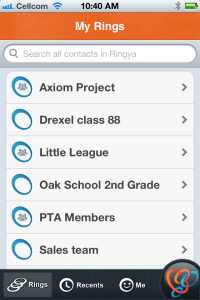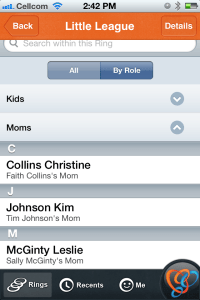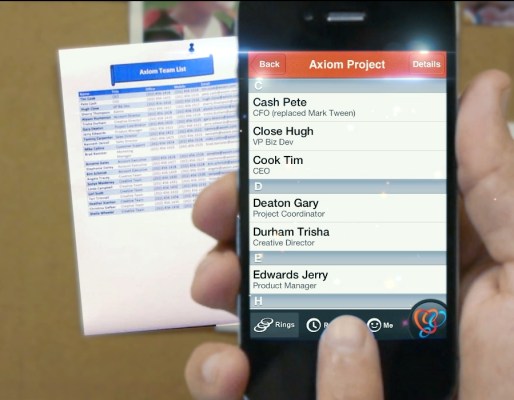If you’ve ever needed a better way to manage your contact lists directly on your iPhone, a new app called Ringya (yeah I know, kind of a dopey name, but stay with me here) can help. But what makes this Address Book replacement app interesting is one of the methods it supports for adding contacts to your groups: you can just take a picture of a contact list that’s printed out on paper. That may seem like a niche use case (who uses paper?!), but it’s actually surprisingly helpful. I’ve already found a handful of paper lists sitting around my house, and for business users, it’s likely even more common.
 The big idea here is that we haven’t completely transitioned into an all-digital world. There are still contact lists hanging on bulletin boards, stuffed in customer files, passed around at PTA meetings, etc. And many of these types of lists are still on paper, whether they’re handwritten or printouts of a Microsoft Office file someone created, but that you don’t have access to. Ringya lets you use your iPhone to snap a picture of that list which it then processes in the cloud using a combination of OCR and human support. It then places the contacts into a group you create and name. In my limited tests with lists found around the house, it worked – even managing to read my chicken-scratch handwriting, although handwritten lists aren’t mentioned as being supported in the Ringya FAQ.
The big idea here is that we haven’t completely transitioned into an all-digital world. There are still contact lists hanging on bulletin boards, stuffed in customer files, passed around at PTA meetings, etc. And many of these types of lists are still on paper, whether they’re handwritten or printouts of a Microsoft Office file someone created, but that you don’t have access to. Ringya lets you use your iPhone to snap a picture of that list which it then processes in the cloud using a combination of OCR and human support. It then places the contacts into a group you create and name. In my limited tests with lists found around the house, it worked – even managing to read my chicken-scratch handwriting, although handwritten lists aren’t mentioned as being supported in the Ringya FAQ.
Although its primary focus is on printed lists, Ringya can also handle business cards. In fact, unlike some other biz card digitization apps (like LinkedIn’s CardMunch, for example), you can actually snap a photo of a bunch of business cards at once instead of having to import them one-by-one by taking pictures. Of course, you’re limited here by how many you can fit in the camera’s viewfinder, and the text needs to zoomed in and legible. Still, when working your way through a large stack, even being able to speed up the process by doing three cards at a time instead of one is a big help.
 Additionally, you can create groups in Ringya by manually entering contacts, emailing in digital lists, or importing contacts from the address book. On that latter option, I wish there was the ability to select multiple contacts at a time, as it’s tedious to create even small groups that way. Once the groups are in the app, you can then email, text or call members individually, or send a group text, email, or send pictures to the group via email. You can also share the group (the “ring”) with others, and search for members by name or company. When contacts in Ringya call you, the app offers a contextual caller ID option that shows you not just their name, but also who they are to you (title, company, or description, e.g.).
Additionally, you can create groups in Ringya by manually entering contacts, emailing in digital lists, or importing contacts from the address book. On that latter option, I wish there was the ability to select multiple contacts at a time, as it’s tedious to create even small groups that way. Once the groups are in the app, you can then email, text or call members individually, or send a group text, email, or send pictures to the group via email. You can also share the group (the “ring”) with others, and search for members by name or company. When contacts in Ringya call you, the app offers a contextual caller ID option that shows you not just their name, but also who they are to you (title, company, or description, e.g.).
Ringya was founded by Gal Nachum, Kobi Hecht, Arie Gofer and Yoram Goren, who together have founded and sold a number of startups, including Unipier Mobile Ltd., Cash-U Mobile Technologies Ltd., Mobix Communications Ltd. and Synopsis Systems Ltd. Ringya is now a team of eight with offices both in the U.S. (Chicago) and Israel, and has $1.5 million in VC funding from undisclosed investors based in Luxembourg, New York, and Israel.
Android users can sign up here to be notified when Ringya arrives on that platform. iPhone users can grab the app here in iTunes.
